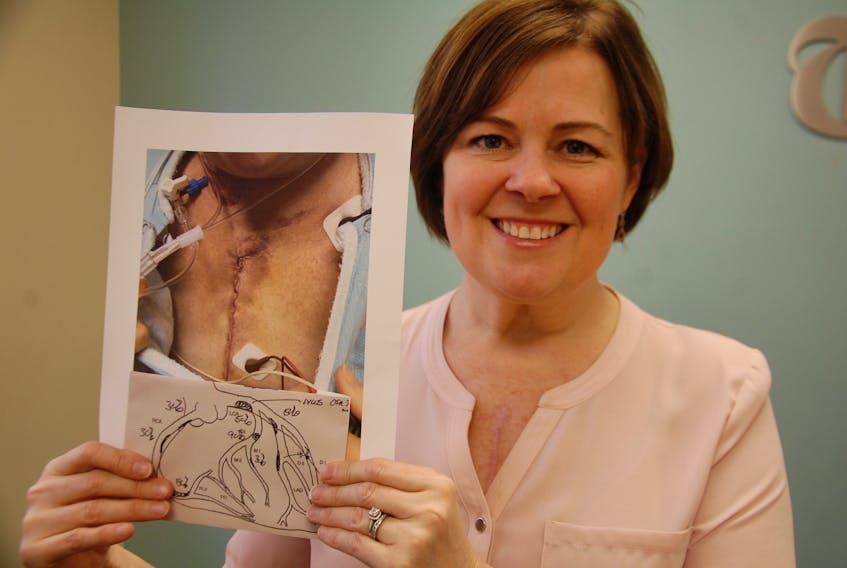CHARLOTTETOWN, P.E.I. - Heart disease snuck up on Angie MacCaull with a vengeance.
She was active.
She was eating well.
She did not smoke.
Then, boom, seemingly out of nowhere, her heart took a big hit.
“Who thinks of heart disease at 45?’’ says the Summerside resident.
“I was healthier than I’d ever been – or I thought I was.’’
Well, it turns out MacCaull was seriously ill. She had eight blockages in her heart. She could have died.
On May 1, 2017, she underwent triple bypass surgery and the replacement of her aortic root.
Looking back, there were warning signs – back pain, aching arms and heaviness in the chest — that her heart was not healthy. She just did not make the connection.
Nor, for some time, did the province’s health-care system (she was misdiagnosed with acid reflux before the real problem was later determined).
Unfortunately, many women in Canada are unnecessarily suffering and dying from heart disease because of inequities and biases that have resulted in a system that is ill equipped to diagnose, treat and support them, according to the Heart and Stroke 2018 Heart Report.
“Heart disease is the leading cause of premature death for women in Canada, yet women’s hearts are still vastly misunderstood,’’ says Heart and Stroke CEO Yves Savoie.
“It’s shocking that we are so far behind in our understanding of women’s hearts and that new knowledge is so slow to reach the bedside.”
Savoie adds women have been under-researched, under-diagnosed and under-treated as well as under-supported and under-aware.
For decades, notes Heart and Stroke, almost all health research was done on men with the assumption that one size fits all. What was learned formed the basis of clinical guidelines, diagnostic procedures and therapies that, even today, are widely used for both sexes and all genders.
Data, however, reveals severe shortcomings:
-- Women with normal angiograms are four times more likely to be readmitted to hospital for chest pain within six months compared to men.
-- The exercise treadmill (or stress) test for cardiac output is far less sensitive for women compared to men and even worse for younger women.
-- Women are less likely to get bypass surgery and stents to restore blood flow, to be prescribed statins to help prevent a second heart attack or to be given anti-clotting therapies.
P.E.I. registered nurse Rachel Currie, who has experience running a cardiac rehabilitation program, urges women to be their own strongest advocate.
“As women we need to educate ourselves, step outside of our comfort zones and be factors for change,’’ says Currie.
“The report is done, the facts are out, the information is available and it is time to make some changes.’’
MacCaull, who now believes stress played a huge part in her serious heart trouble, is taking charge of her health.
For starters, the mother of a five-month-old girl says she is doing her best to no longer stress the small stuff.
She is also continuing to put a strong focus on eating healthy and exercising as regularly as possible.
MacCaull hopes her story can serve as a cautionary tale. She urges women to take care of their bodies – and don’t dismiss potential warning signs of heart disease.
“We know our bodies the best,’’ she says.
“If something doesn’t feel right…it’s definitely worth checking into.’’
Women and heart disease
The Heart & Stroke 2018 Heart Report highlights the following alarming data concerning women and heart disease:
– A woman dies of heart disease in Canada every 20 minutes.
– Two-thirds of heart disease clinical research still focuses on men.
– Women are five times more likely to die from heart disease than breast cancer.
– Women are more likely than men to die or have a second heart attack within the first six months of a cardiac event.
Heeding the signs
– The most common heart attack sign is chest discomfort. However women can experience a heart attack without chest pressure. They may experience shortness of breath, pressure or pain in the lower chest or upper abdomen, dizziness, light-headedness or fainting, upper back pressure, jaw pain or extreme fatigue.
– To learn more about risk factors, visit http://www.heartandstroke.ca/get-healthy.
Source: Heart and Stroke









